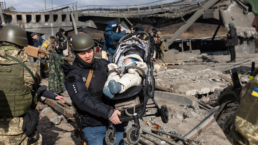As calls grow for a ‘victory’ over Russia, we should examine whether such a win-lose outcome is even possible.
By George Beebe, Responsible Statecraft
Tell me how this ends. General David Petraeus famously posed this question at the outset of the Iraq War in 2003.
In retrospect, to say that the Bush administration’s expectations for the war proved too optimistic would be a vast understatement. The White House anticipated a democratic and prosperous Iraq that would catalyze liberalization in the authoritarian regimes dominating the Middle East and drain the swamp of Islamic radicalism.
Instead, Operation Iraqi Freedom removed an important counterbalance to Iranian power and plunged the region into decades of instability, the ill effects of which are continuing to resonate for the United States, Europe, and the world.

In our outrage over Russia’s brutal invasion of Ukraine and determination to counter Moscow’s aggression, many are debating what we should do, but few are pausing to ponder the question of how this war ends. As the Russian operation has stumbled on the battlefield, some prominent U.S. and British officials and many erstwhile cheerleaders for the war in Iraq are talking more and more openly about victory over Russia, decisively debilitating the Russian military, and even regime change in Moscow. Dare we hope that Putin’s blunder in Ukraine could poetically produce the very outcomes he wished to prevent: an expanded and invigorated NATO alliance more deeply ensconced along Russia’s periphery, Russia’s marginalization in the world, and even his own fall from power?
Recent Posts
The Dangers Of Nuclear War Have Never Been Higher
July 16, 2025
Take Action Now Yet mainstream US media outlets and partisan politics are routinely oblivious to threat of oblivion.By Norman Solomon, The Nation…
‘Gaza Journalists Under Fire’, A Zero Hour Conversation With Robert Greenwald
July 16, 2025
Take Action Now Robert Greenwald appeared on The Zero Hour to discuss “Gaza: Journalists Under Fire,” his new documentary on the 200+…
Is A Citizens United 2.0 Right Around The Corner?
July 15, 2025
Take Action Now Is it possible for American democracy to be further degraded by the influence of billionaires? Thanks to champion of the working…
U.S. Leaders Gave Up On Diplomacy With Iran. We Must Make Them Return To It.
July 15, 2025
Take Action Now Building an antiwar movement means preventing the systemic U.S. aggression that creates the conditions for war.By Hanieh Jodat,…




